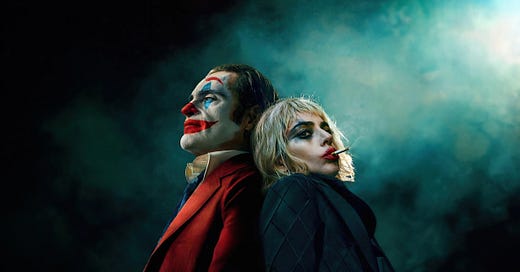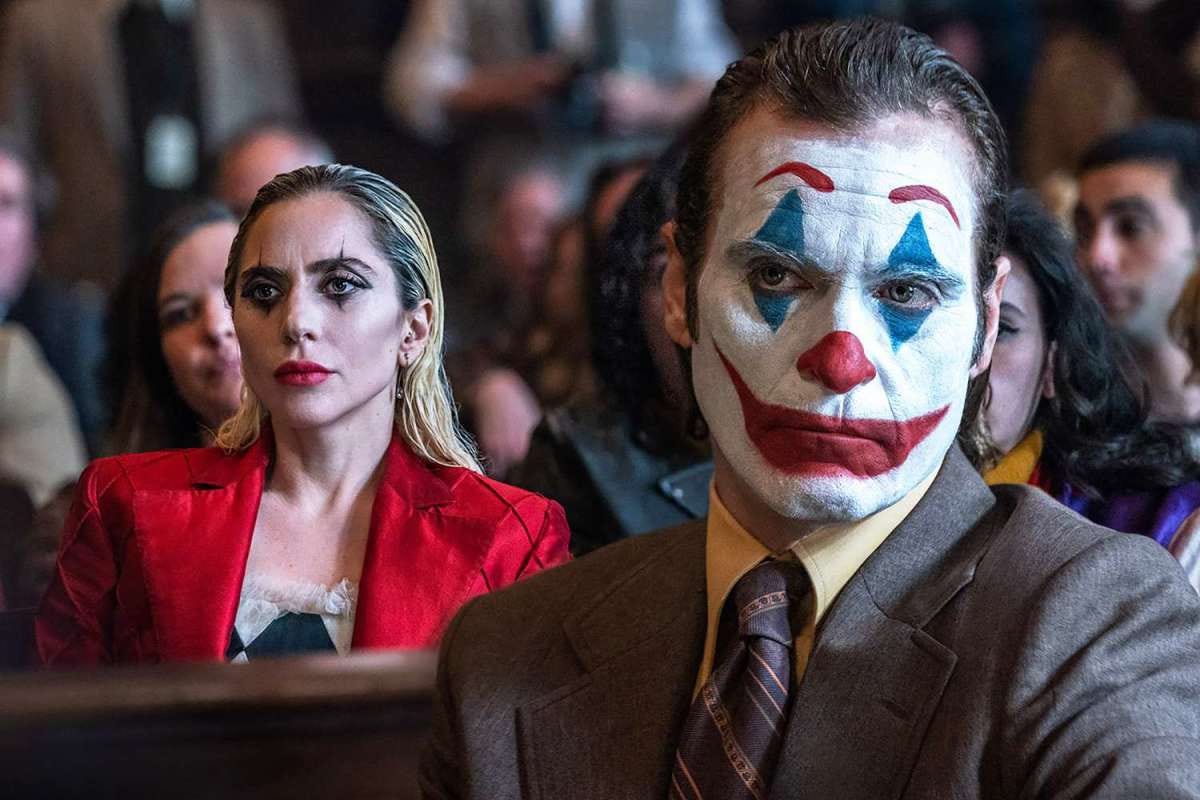‘Joker: Folie à Deux’: Reversing the Interest Polarity
The sequel is a tedious, boring affair because it does the character arc backwards.
NEW STANDARD DISCLAIMER: This newsletter aggressively spoils things.
There’s a line from Sunset Boulevard that’s always been an unofficial motto of mine: “Sometimes it’s fun to see just how bad bad writing can be1.” And it is! It’s super fun. Which is how I explain the fact that I watched Joker: Folie à Deux a long, long time after the reviews made it clear this was not a good film2.
I didn’t love the original film. Joker is a dour exercise in borrowed style, for the most part3. But it did have a compelling performance from Joaquin Phoenix, and it had at least one thing going for it: The character of Arthur Fleck gets more interesting as the story progresses4. He starts off as an irritatingly inert person and slowly becomes active (in the most cynically violent way, but still). That character arc gives the film a sense of propulsion, and it’s blessed by becoming more compelling as it goes. When Arthur goes full Joker he’s a lot more fun than he was as the mumbling, shambling Fleck5.
The second film can be seen almost as an apology for the first. Fleck, imprisoned and awaiting trial, slowly loses his grip on the Joker persona and eventually rebukes him altogether before finally being revealed as not even the real Joker, but a false start6. Its energy is the opposite of the first film: Joker slowly devolves back into Fleck. And as a result the film gets less interesting and less compelling as it goes, which is, you know, not how you want your story to go, generally speaking.
Come On, Be Happy
The idea of reversing Arthur’s evolution and basically undoing the first story is one of those writing ideas that sounds great on paper7. If things can be truthy, then this is an example of something that’s clevery—it has the look and feel of something clever. It subverts expectations. It zigs when people might expect it to zag8. Where most sequels—especially in the superhero genre—expand upon what came before, making characters more powerful, more important, more, the way Joker: Folie à Deux goes the other way feels like it should be an exciting innovation.
The problem is that it’s like watching one of those time-lapse videos backwards: Instead of anticipating something cool happening, you’re anticipating something very boring: The return of Full Arthur Fleck. You begin the watching experience excited to see where Joker will go, how the character will develop, what feats of insanity he will get up to. And you wind up watching someone collapse in on themselves.
In theory, that’s interesting. In theory, that’s clever. But something can be kind of clever and also very boring at the same time9, and the folks behind Joker: Folie à Deux somehow figured out that rare alchemy.
I've Got This Sneaking Suspicion We're Not Giving The People What They Want!
Of course, the film has other problems. It’s essentially a courtroom drama, like a weirdly oversize episode of Law & Order, which means we spend a lot of time watching Arthur brood or playact a chicken-fried Southern lawyer. It’s never quite clear how big the movement that Joker inspired is supposed to be, and Harleen Quinzel (Lady Gaga), aka Harley Quinn, is never an actual character. She’s more or less Arthur’s Id, urging him to go Full Joker and encouraging him in his delusional musical fantasies10.
Ah, yes, the musical aspect: Again, an idea that seems clevery. Depicting the inner life of someone through fantasy musical sequences has been done, and done well. Combining Arthur Fleck’s insanity and violence with classic showtunes and dance routines? That sounds kind of cool!
In practice, it is not. The musical interludes just sort of happen, with zero thought about pacing or meaning, and Phoenix doesn’t exactly glide through them, though that might be considered a character interpretation. If the real-world scenes had been a bit more realistic, the contrast between a gossamer musical world where Joker and Harley are graceful beauties might have been interesting, but they’re staged with such disinterest they just feel random.
There’s a phrase you hear a lot in the writing business: Kill your darlings11. It usually means you have to be willing to sacrifice clever bits from your stories for the greater good—don’t get hung up on a scene or character or dialog exchange that isn’t helping just because you like it. It’s a tough lesson to implement, because sometimes those darlings are brilliant in isolation—they just fuck up your story. Joker: Folie à Deux feels like a whole lot of darlings got spared, at the expense of an interesting, coherent film12.
Ah well, I chose to watch this movie despite ample evidence of its jackass nature, so that’s on me. My lack of free cocktails, however, is squarely on you.
NEXT WEEK: Y2K for some reason.
If you enjoy this newsletter, consider subscribing to my paid fiction Substack, Writing Without Rules: From the Notebook!
This is also what I mumble to myself every time I start a new novel.
In the Age of Content, however, concepts like “good” or “bad” or “so boring I started poking myself with a needle just to feel something” no longer mean anything.
Is A Dour Exercise in Borrowed Style the title of my memoir? It sure captures the general vibe, don’t it?
Just like me when you start buying me drinks.
The dancing has a lot to do with it. This is also part of my character arc when you start buying me drinks.
I am increasingly convinced that Joaquin Phoenix chooses roles that allow him to never wash his hair again.
Just like my novel written entirely in haiku. It should have been brilliant, dammit.
This is also how I approach dancing after the appropriate number of cocktails.
Is Kind of Clever and Also Very Boring the title of my memoir? It also captures the general vibe, I’ll grant you.
I have one of those, too, which is why The Levon Sobieski Domination exists. You’re welcome.
As with most things to do with writing, this is a lot less exciting than it sounds.
Is Interesting and Coherent the title of my memoir? Surely you jest.







Thanks for the review. I saw the first movie, courtesy of the Wheaton Library, because a friend said I had to see it.
It was disturbing.
I didn't enjoy it.
So this movie comes out.
There's no reason why I would see it.
Day drinking aside.
Besides, I'm not a fan of the French language.
Am I the only person on earth who finds the Joker and Harley Quinn simply exhausting? I've long felt the Joker peaked with Cesar Romero (with respect to Heath Ledger as well), while psycho-murder cute girl simply never worked for me.
I doubt this means I would enjoy Joker Devolving Into a Schlub though. Probably just as well I skipped both of these.